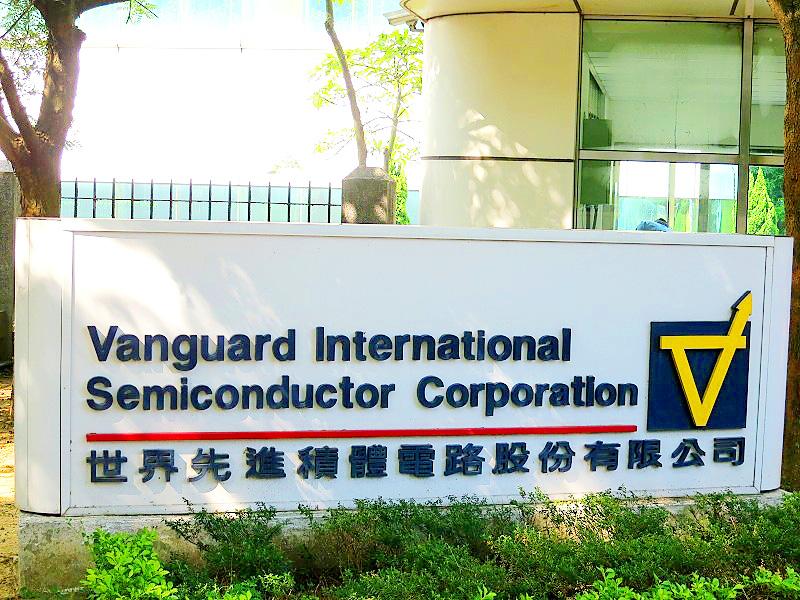Vanguard International Semiconductor Corp (世界先進), a supplier of display driver ICs and power management chips, expects its revenue next year to surpass the 12 percent annual rate estimated for the global foundry sector, driven by robust demand for chips used in electric vehicles (EVs) and 5G smartphones.
To manage rising chip demand, Vanguard increased its capital expenditure for this year to between NT$8.5 billion and NT$9 billion (US$305.21 million and US$323.16 million), from NT$8.5 billion estimated three months ago.
The expenditure increase would boost capacity slightly this year and about 8 percent next year, it said.

Photo: Grace Hung, Taipei Times
The chipmaker is considering investing in a new 12-inch fab, it said, adding that a small percentage of the chips that are being made at 8-inch fabs would be produced at 12-inch fabs in the next few years because of cost efficiency.
Vanguard operates four 8-inch fabs and is constructing a fifth one.
“Overall, our customers continue to show robust demand for our foundry services. With our current order visibility, we expect factory utilization to remain high throughout the first half of 2022,” Vanguard chairman Fang Leuh (方略) told an investors’ teleconference.
“We hold a positive outlook on next year,” Fang said. “We will outperform the estimated growth in the global foundry sector thanks to growth momentum coming from all segments.”
IC Insights forecast that the global foundry sector would see compound annual growth of 12.2 percent in the five-year period to 2025.
EVs and 5G smartphones are to be the main growth drivers, Vanguard said, due to higher market penetration and the higher number of semiconductors needed.
Replacement demand would also fuel robust demand for commercial laptops next year, the chipmaker said.
Growth momentum this quarter continues to be robust, Vanguard said, adding that growth did not slacken when it shifted to supply driver ICs for high-resolution 4K and 8K TV panels from low-end 50-inch TV panels.
Revenue this quarter is expected to increase 2.56 to 6.93 percent to between NT$12.3 billion and NT$12.7 billion, which would be another record quarter, Fang said.
Gross margin this quarter is expected to be 45.5 to 47.5 percent, compared with 45.8 percent last quarter, the company said.
Vanguard expects shipments of driver ICs used in mobile phones and other consumer electronics panels to show sequential growth this quarter.
Net profit in the three months to September increased to a record NT$3.29 billion, more than doubling the NT$1.53 billion of a year earlier and representing quarterly growth of 26.4 percent from NT$2.6 billion.
Earnings per share last quarter rose to NT$1.99, up from NT$0.93 a year earlier and NT$1.53 in the prior quarter.

‘SWASTICAR’: Tesla CEO Elon Musk’s close association with Donald Trump has prompted opponents to brand him a ‘Nazi’ and resulted in a dramatic drop in sales Demonstrators descended on Tesla Inc dealerships across the US, and in Europe and Canada on Saturday to protest company chief Elon Musk, who has amassed extraordinary power as a top adviser to US President Donald Trump. Waving signs with messages such as “Musk is stealing our money” and “Reclaim our country,” the protests largely took place peacefully following fiery episodes of vandalism on Tesla vehicles, dealerships and other facilities in recent weeks that US officials have denounced as terrorism. Hundreds rallied on Saturday outside the Tesla dealership in Manhattan. Some blasted Musk, the world’s richest man, while others demanded the shuttering of his

ADVERSARIES: The new list includes 11 entities in China and one in Taiwan, which is a local branch of Chinese cloud computing firm Inspur Group The US added dozens of entities to a trade blacklist on Tuesday, the US Department of Commerce said, in part to disrupt Beijing’s artificial intelligence (AI) and advanced computing capabilities. The action affects 80 entities from countries including China, the United Arab Emirates and Iran, with the commerce department citing their “activities contrary to US national security and foreign policy.” Those added to the “entity list” are restricted from obtaining US items and technologies without government authorization. “We will not allow adversaries to exploit American technology to bolster their own militaries and threaten American lives,” US Secretary of Commerce Howard Lutnick said. The entities

Minister of Finance Chuang Tsui-yun (莊翠雲) yesterday told lawmakers that she “would not speculate,” but a “response plan” has been prepared in case Taiwan is targeted by US President Donald Trump’s reciprocal tariffs, which are to be announced on Wednesday next week. The Trump administration, including US Secretary of the Treasury Scott Bessent, has said that much of the proposed reciprocal tariffs would focus on the 15 countries that have the highest trade surpluses with the US. Bessent has referred to those countries as the “dirty 15,” but has not named them. Last year, Taiwan’s US$73.9 billion trade surplus with the US

Prices of gasoline and diesel products at domestic gas stations are to fall NT$0.2 and NT$0.1 per liter respectively this week, even though international crude oil prices rose last week, CPC Corp, Taiwan (台灣中油) and Formosa Petrochemical Corp (台塑石化) said yesterday. International crude oil prices continued rising last week, as the US Energy Information Administration reported a larger-than-expected drop in US commercial crude oil inventories, CPC said in a statement. Based on the company’s floating oil price formula, the cost of crude oil rose 2.38 percent last week from a week earlier, it said. News that US President Donald Trump plans a “secondary